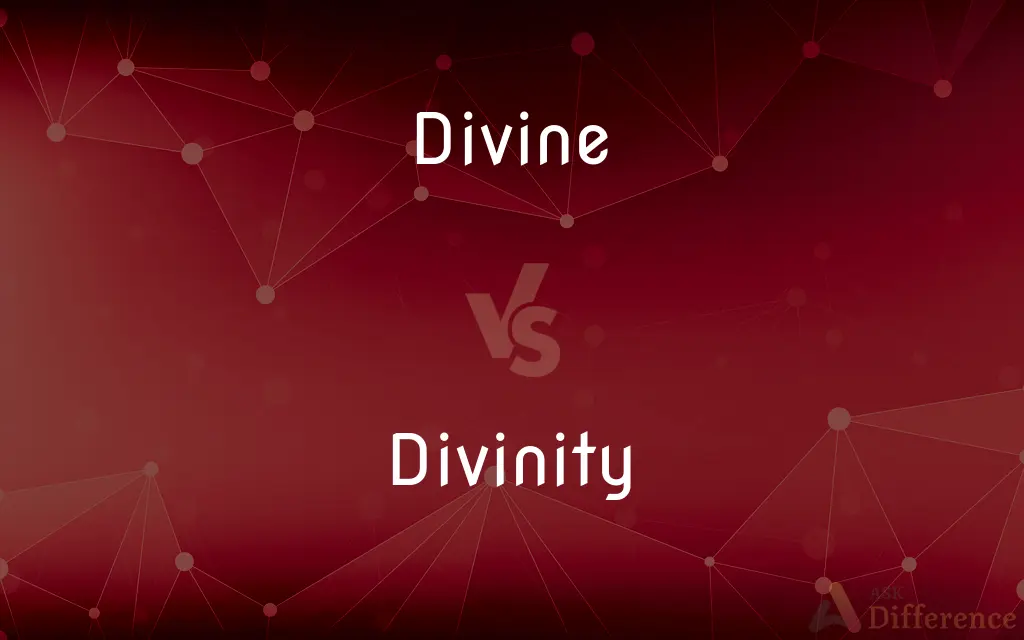Divine vs. Divinity — What's the Difference?
Edited by Tayyaba Rehman — By Urooj Arif — Updated on April 8, 2024
Divine involves godly or supernatural qualities, focusing on being or actions, while divinity refers to the state of being divine or a study of religious matters.

Difference Between Divine and Divinity
Table of Contents
ADVERTISEMENT
Key Differences
Divine often describes something of, from, or like a god, implying a connection to the supernatural or the celestial. This term can refer to qualities, powers, or actions believed to be far beyond human capabilities, often associated with gods, spirits, or the sacred. Whereas divinity deals more with the abstract nature or state of being divine, including the study of religious concepts, theology, and the nature of gods themselves. Divinity is also used to denote a subject of study that focuses on religion and the divine.
While divine can be used as an adjective to describe entities, actions, or qualities that possess a god-like nature or supernatural attributes, such as divine intervention or divine beauty, it can also function as a verb, meaning to discover by intuition or insight. On the other hand, divinity, as a noun, primarily signifies the quality of being divine, a divine being, or the academic discipline concerned with the study of the divine and religious matters.
Divine often carries a sense of awe, reverence, or sublime beauty, suggesting something that surpasses human understanding or ability. It is frequently used in contexts that emphasize the extraordinary or the miraculous. Divinity, however, leans more towards an academic or theological context, referring to the study and understanding of divine matters, theological principles, or the nature of deity itself.
In literature and everyday language, divine is a versatile term that can describe supreme beauty, virtue, or excellence, often used to express a high degree of admiration or pleasure. For instance, one might refer to a piece of music or a landscape as divine. Divinity, conversely, is less likely to be used in casual speech and is more confined to discussions on theology, religious studies, and the characteristics or aspects of the divine.
The usage of divine and divinity also reflects cultural and religious perceptions. Divine can denote direct involvement or characteristics of a deity in various cultural narratives, symbolizing purity, perfection, or otherworldly wisdom. Divinity encapsulates the essence or state of being divine, and is more abstract, often used to discuss or analyze theological concepts, religious doctrines, and the divine's role in the universe.
ADVERTISEMENT
Comparison Chart
Nature
Adjective/Verb
Noun
Meaning
Pertaining to gods or a god, god-like, heavenly
The quality of being divine, a divine being, study of religion
Usage in a sentence
Divine intervention saved the day.
He devoted his life to the study of divinity.
Context
Religious, spiritual, supernatural, also artistic excellence
Religious studies, theology, the nature of being divine
Example of use
Divine wisdom is beyond human understanding.
Divinity explores concepts of godliness and sacredness.
Compare with Definitions
Divine
Pertaining to god or a god.
The divine realm is where deities reside.
Divinity
Theology, especially Christian theology.
Divinity school is where he studied to become a pastor.
Divine
To discover something by intuition.
He divined the answer to the riddle effortlessly.
Divinity
A divine being. a god or goddess.
Zeus was a divinity worshiped in ancient Greece.
Divine
Relating to or proceeding directly from God.
Divine law governs the universe.
Divinity
The academic study of religious matters.
She majored in divinity at the university.
Divine
Blessed, as if endowed with divine favor.
They felt divine protection during their journey.
Divinity
The state of being divine.
The ancient texts speak of heroes ascending to divinity.
Divine
Having the nature of or being a deity.
Divinity
The quality of being associated with gods.
The divinity of the temple was palpable.
Divine
Of, relating to, emanating from, or being the expression of a deity
Sought divine guidance through meditation.
Divinity
Divinity or the divine are things that are either related to, devoted to, or proceeding from a deity. What is or is not divine may be loosely defined, as it is used by different belief systems.
Divine
Being in the service or worship of a deity; sacred.
Divinity
The state or quality of being divine.
Divine
Superhuman; godlike.
Divinity
Divinity The godhead; God. Used with the.
Divine
Supremely good or beautiful; magnificent
A divine performance of the concerto.
Divinity
A deity, such as a god or goddess.
Divine
Extremely pleasant; delightful
Had a divine time at the ball.
Divinity
Godlike character.
Divine
A cleric.
Divinity
Theology.
Divine
A theologian.
Divinity
A soft white candy, usually containing nuts.
Divine
To foretell, especially by divination.
Divinity
(uncountable) The state, position, or fact of being a god or God. [from 14th c.]
Divine
To guess or know by inspiration or intuition
Somehow divined the answer despite not having read the assignment.
Divinity
(countable) deity.
You may leave out where you live and use either initials or an alias, since gods, buddhas and other divinities look only at our hearts.
Divine
To locate (underground water or minerals) with a divining rod; douse.
Divinity
A celestial being inferior to a supreme God but superior to man.
Divine
To practice divination.
Divinity
(uncountable) The study of religion or religions.
Harvard Divinity School has been teaching theology since 1636.
Divine
To guess.
Divinity
A type of confectionery made with egg whites, corn syrup, and white sugar.
Divine
Of or pertaining to a god.
Divinity
The state of being divine; the nature or essence of God; deity; godhead.
When he attributes divinity to other things than God, it is only a divinity by way of participation.
Divine
Eternal, holy, or otherwise godlike.
Divinity
The Deity; the Supreme Being; God.
This the divinity that within us.
Divine
Of superhuman or surpassing excellence.
Divinity
A pretended deity of pagans; a false god.
Beastly divinities, and droves of gods.
Divine
Beautiful, heavenly.
Divinity
A celestial being, inferior to the supreme God, but superior to man.
God . . . employing these subservient divinities.
Divine
(obsolete) Foreboding; prescient.
Divinity
Something divine or superhuman; supernatural power or virtue; something which inspires awe.
They say there is divinity in odd numbers.
There's such divinity doth hedge a king.
Divine
Immortal; elect or saved after death
Divinity
The science of divine things; the science which treats of God, his laws and moral government, and the way of salvation; theology.
Divinity is essentially the first of the professions.
Divine
Relating to divinity or theology.
Divinity
Any supernatural being worshipped as controlling some part of the world or some aspect of life or who is the personification of a force
Divine
One skilled in divinity; a theologian.
Divinity
The quality of being divine;
Ancient Egyptians believed in the divinity of the Pharaohs
Divine
A minister of the gospel; a priest; a clergyman.
Divinity
White creamy fudge made with egg whites
Divine
(often capitalized, with 'the') God or a god, particularly in its aspect as a transcendental concept.
Divinity
The rational and systematic study of religion and its influences and of the nature of religious truth
Divine
(transitive) To foretell (something), especially by the use of divination.
Divine
(transitive) To guess or discover (something) through intuition or insight.
Divine
(transitive) To search for (underground objects or water) using a divining rod.
Divine
To render divine; to deify.
Divine
Of or belonging to God; as, divine perfections; the divine will.
Divine
Proceeding from God; as, divine judgments.
Divine
Appropriated to God, or celebrating his praise; religious; pious; holy; as, divine service; divine songs; divine worship.
Divine
Pertaining to, or proceeding from, a deity; partaking of the nature of a god or the gods.
Divine
Godlike; heavenly; excellent in the highest degree; supremely admirable; apparently above what is human. In this application, the word admits of comparison; as, the divinest mind.
A divine sentence is in the lips of the king.
But not to one in this benighted ageIs that diviner inspiration given.
Divine
Presageful; foreboding; prescient.
Yet oft his heart, divine of something ill,Misgave him.
Divine
Relating to divinity or theology.
Church history and other divine learning.
Divine
One skilled in divinity; a theologian.
Divine
A minister of the gospel; a priest; a clergyman.
The first divines of New England were surpassed by none in extensive erudition.
Divine
To foresee or foreknow; to detect; to anticipate; to conjecture.
A sagacity which divined the evil designs.
Divine
To foretell; to predict; to presage.
Darest thou . . . divine his downfall?
Divine
To render divine; to deify.
Living on earth like angel new divined.
Divine
To use or practice divination; to foretell by divination; to utter prognostications.
The prophets thereof divine for money.
Divine
To have or feel a presage or foreboding.
Suggest but truth to my divining thoughts.
Divine
To conjecture or guess; as, to divine rightly.
Divine
Terms referring to the Judeo-Christian God
Divine
A clergyman or other person in religious orders
Divine
Perceive intuitively or through some inexplicable perceptive powers
Divine
Search by divining, as if with a rod;
He claimed he could divine underground water
Divine
Emanating from God;
Divine judgment
Divine guidance
Everything is black1 or white...satanic or godlyt
Divine
Resulting from divine providence;
Providential care
A providential visitation
Divine
Being or having the nature of a god;
The custom of killing the divine king upon any serious failure of his...powers
The divine will
The divine capacity for love
'Tis wise to learn; 'tis God-like to create
Divine
Devoted to or in the service or worship of a deity;
Divine worship
Divine liturgy
Divine
Appropriate to or befitting a god;
The divine strength of Achilles
A man of godlike sagacity
Man must play God for he has acquired certain godlike powers
Divine
Of such surpassing excellence as to suggest divine inspiration;
Her pies were simply divine
The divine Shakespeare
An elysian meal
An inspired performance
Common Curiosities
What does divine mean in religious contexts?
In religious contexts, divine refers to anything related to, characteristic of, or attributed to a god or deity, embodying holiness or sacredness.
Is divine always related to positive qualities?
Mostly, yes. Divine typically conveys a sense of perfection, beauty, wisdom, or benevolence, although it can also describe awe-inspiring or fearsome attributes.
Can anything be considered divine?
The term divine can be applied to anything regarded as having a god-like or extraordinarily sublime quality, including natural wonders, artistic works, or moral virtues.
How do divine and divinity differ in usage?
Divine is often used as an adjective or verb to describe something god-like or to foretell, while divinity is a noun referring to the study of religion or the state of being divine.
Can divine be used in a non-religious context?
Yes, divine can also describe anything exceptionally beautiful, pleasing, or wise, not necessarily related to religious or spiritual matters.
Can divinity be studied?
Yes, divinity is an academic discipline that involves the study of religious beliefs, theological principles, and the nature of the divine.
Are there different types of divinity in religions?
Yes, different religions have varied concepts of divinity, including monotheistic beliefs in a single supreme deity or polytheistic traditions with multiple gods and goddesses.
How is divine inspiration understood?
Divine inspiration refers to the belief that individuals can receive guidance, wisdom, or creativity from a divine source, often seen in artistic or religious contexts.
How do divinity and divine complement each other?
While divine often describes attributes or actions of a god-like nature, divinity focuses on the state or study of being divine, both contributing to understanding the sacred.
What does it mean to study divinity?
Studying divinity involves exploring theological doctrines, religious texts, the nature of divinity, and ethical implications of religious beliefs.
Can humans achieve divinity?
In many religious or mythological traditions, humans achieving divinity is a concept where individuals ascend to a god-like status, often through extraordinary deeds or virtues.
What is the significance of divine law?
Divine law represents the moral and ethical codes believed to be prescribed by a god or gods, often serving as the foundation for religious practices and beliefs.
How do divine actions impact the world?
Divine actions are thought to have profound impacts on the world, influencing natural events, human lives, and the course of history according to religious beliefs.
What role does divinity play in theology?
In theology, divinity is a central concept that examines the nature, will, and attributes of the divine, shaping the foundation of religious studies and practices.
Is divinity the same across all cultures?
While the concept of divinity is common across many cultures, its characteristics, interpretations, and the beings considered divine vary widely.
Share Your Discovery

Previous Comparison
Cup vs. Tumbler
Next Comparison
Guarantee vs. AssureAuthor Spotlight
Written by
Urooj ArifUrooj is a skilled content writer at Ask Difference, known for her exceptional ability to simplify complex topics into engaging and informative content. With a passion for research and a flair for clear, concise writing, she consistently delivers articles that resonate with our diverse audience.
Edited by
Tayyaba RehmanTayyaba Rehman is a distinguished writer, currently serving as a primary contributor to askdifference.com. As a researcher in semantics and etymology, Tayyaba's passion for the complexity of languages and their distinctions has found a perfect home on the platform. Tayyaba delves into the intricacies of language, distinguishing between commonly confused words and phrases, thereby providing clarity for readers worldwide.














































